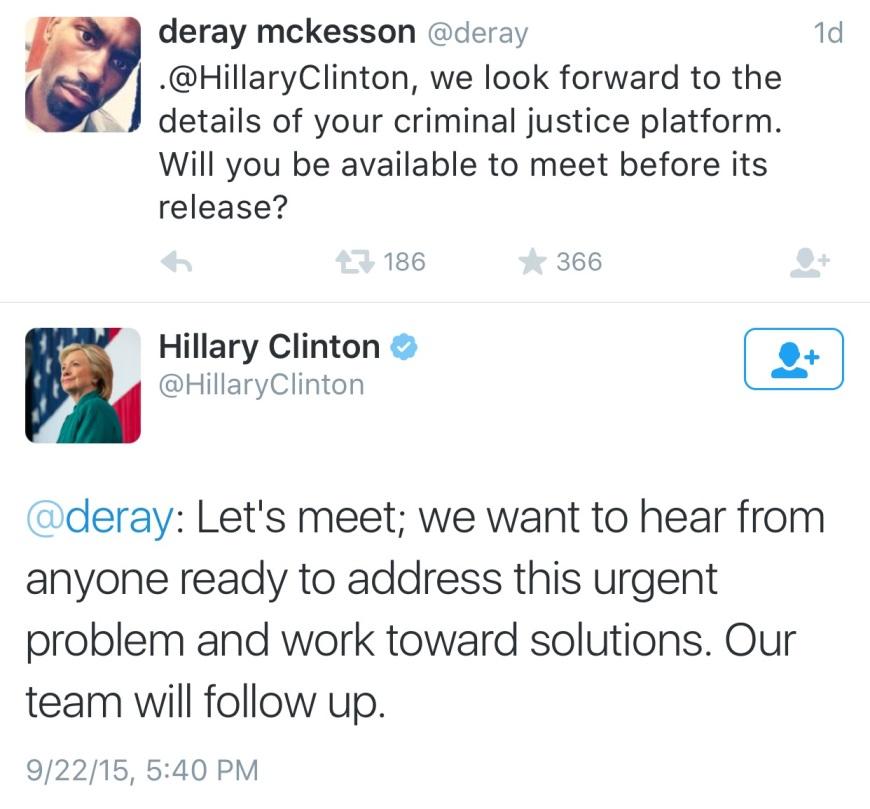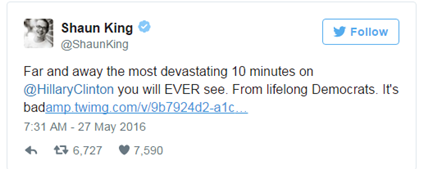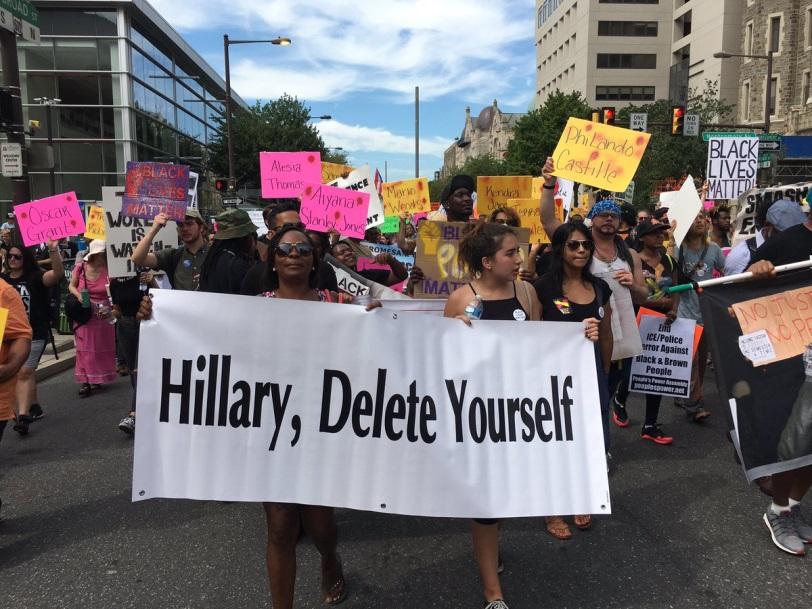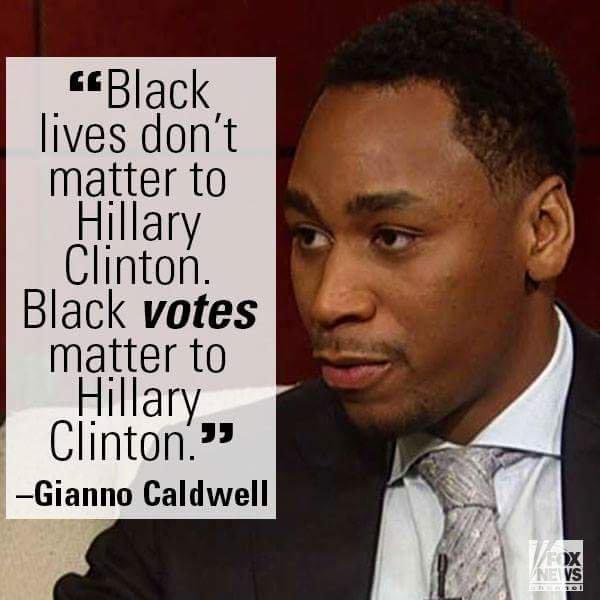
The impact of Black Lives Matter on Hillary Clinton’s message on racial justice
Black Lives Matter is a social movement in the United States of America, that fights for the rights of African Americans. This paper will analyze whether they influenced Hillary Clinton’s message during the last elections, or not.
Difficulties and disadvantages
12 percent of the inhabitants of the US are of Afro-American descent (The USA, n.d.). Since African-American people face more difficulties and disadvantages when it comes to finance (Redden & Kasperkevic, 2016), education (Klein, 2014; Steele, 1992), and discrimination (Quigley, 2010; Pilkington & Luscombe, 2013), among other things, in comparison to white American people, black people are encouraged to stand up for their rights. In the past, the Civil Rights Movement played a major role in improving civil rights for African-Americans. Nowadays, the social movement Black Lives Matter fulfills that role.
Hillary Clinton focused multiple times on African American voters during the last elections. Since the African American population was so important to her, considering the way in which her campaign focused on these people, it is interesting to investigate whether Black Lives Matter influenced Clinton during the last elections. Therefore, the research question of this paper is: ‘How did Black Lives Matter influence the message of Hillary Clinton on racial justice?’ To answer this question, this paper will include a theoretical framework on what Black Lives Matter is, and what the social movement says about racial justice. This will help with analyzing how Black Lives Matters exerted pressure on Hillary Clinton during the last elections, how Clinton copies the statements of Black Lives Matters, and how these statements fit into Clinton’s current message and that of the past. To answer this question, data from several sources with regards to both Hillary Clinton's stance on racial equality and the Black Lives Matter movement has been collected and analyzed.
Black Lives Matter on racial justice
Black Lives Matter is a social movement concerning the rights and the lives of black American people. The movement was founded in 2013 by Alicia Garza, Opal Tometi and Patrisse Cullors, after 17-year-old Trayvon Martin, a black American, was killed. The movement especially fights for criminal justice, and the stopping of the systematic criminalization of black people. The movement started with the hashtag #BlackLivesMatter in the summer of 2013, when Alicia Garza responded to the acquittal of George Zimmerman, the man who shot Trayvon Martin, on her Facebook page (Stephen, n.d.). Since then, the hashtag became the characteristic of millions of people, who wanted change for black people. The movement instantly made a political agenda, and mobilized people using websites like Facebook and Twitter (Ruffin, n.d). Thanks to the velocity of social media, they quickly reached thousands of people who had similar views. However, despite the success of using social media to spread the ideas of Black Lives Matter, they also used the traditional way of mobilizing people.
To understand the success of Black Lives Matter, we need to understand how they manage their visibility. Thompson (2005) states that ‘the field of vision is no longer constrained by the spatial and temporal properties of the here and now but is shaped, instead, by the distinctive properties of communication media, by a range of social and technical considerations (…) and by the new types of interaction that these media make possible.’ (p. 35-36). Thompson writes about political leaders and their communication tools and opportunities. Political leaders can show themselves as not only leaders, but also as human beings, according to Thompson. When applying this to the founders of Black Lives Matter, this is exactly what made them successful: they were able to use new media, where they could interact with people, and could show them that they are ‘one of them’. Compared to leaders in the government, who stand far more away from the citizens, the founders of Black Lives Matter are approachable, and show their supporters that they are like them. Thisboosted the mobilization and addressivity powers of the movement as well.
Moreover, Black Lives Matter also calls themselves ideological:
‘’Black Lives Matter is an ideological and political intervention in a world where Black lives are systematically and intentionally targeted for demise. It is an affirmation of Black folks’ contributions to this society, our humanity, and our resilience in the face of deadly oppression.’’
This refers to a certain consciousness, a certain belief about what politics are: a discursive battle of meaning. They want to change what is the standard nowadays, what's considered as normal. Blommaert (2005) describes ideology as the combination of discourse and power: ‘combine the two terms and we think of ideology’. The movement uses discourse to address political leaders like Clinton, but other people as well. With regards to power, the movement has achieved a few things, by using their power, such as an improvement in the Federal Bureau of Investigation's tracking of fatal police shootings and a change in mentality after students protested against discrimination and racial insensitivity at universities in 2015.
They have a specific set of symbolic representations as well, an example of which is their logo, and they have a specific purpose, namely striving for equal and better rights for black people in America. Besides, Black Lives Matter is a phenomenon that characterizes the beliefs of a particular group of Afro-American citizens. Black Lives Matter thus does not represent the whole black community, but only the people that have the same views as they do.
Black Lives Matter also has a clear political message. Lempert and Silverstein (2012) define a political message as follows: ‘’Message is the politician’s publicly imaginable ‘character’ presented to an electorate, with a biography and a moral profile crafted out of issues rendered of interest in the public sphere’’. Black Lives Matter has a clear publicly imaginable ‘character’. They put a lot of effort into mobilizing people, to be known by politicians, and to be visible in the media. Moreover, they are very present on social media, which has made them publically visible. They present their message to an electorate, namely American citizens. The movement has a biography, and their campaign website makes their history easily accessible for anyone who might be interested. They have a clear moral profile about racial justice – the injustice against African American citizens - and that profile is established from what interests the public sphere: the founders of the movement knew that there were a lot of people with the same ideas and desires as them.
The pressure of Black Lives Matter on Clinton
To answer the research question, it is important to examine if, and in what degree, the movement Black Lives Matter has exerted pressure on Hillary Clinton's message with regards to racial injustice. When it comes to Twitter, the movement knew how to use the medium to get things done. For instance, in September 2015, Black Lives Matter activist DeRay Mckesson tweeted Hillary Clinton and asked her to meet him before the revealing of her criminal justice platform. Hillary Clinton replied that she wanted to meet him; something that would not have happened when DeRay Mckesson would not have tweeted her. He thus used social media to exert pressure on the presidential candidate to make something happen, and because this happened on Twitter, the act was also very publically visible.

Furthermore, Shaun King, a Black Lives Matter activist, but also a writer for New York Daily News, tweeted on a video, on May 27th of last year, featuring Democrats stating that Clinton's campaign reached a new low, after Wikileaks revealed a lot of her e-mails (Street, 2016). King wrote that he thought that the video featured ‘the most devastating 10 minutes on Hillary Clinton you will EVER see’.

This is what Thompson (2005) has called ‘the double-edged sword’. With this, he refers to the fact that the political field becomes increasingly intertwined with mediated form of communication, like social media. The existence of (new) media has brought new opportunities to political leaders, but their existence also brings new risks with it:
‘’Whether they like it or not, political leaders today are more visible to more people and more closely scrutinized than they ever were in the past; and at the same time, they are more exposed to the risk that their actions and utterances, and the actions and utterances of others, may be disclosed in ways that conflict with the images they wish to project.‘’ (Thompson, 2005, p. 42).
'The political field and new media together, are like a double-edged sword'
This is what happened in the case of Clinton's presidential campaign: because of the existence of Twitter (and other kinds of social media), information flows through the Internet cannot be completely controlled by her campaign team. Clinton therefore faces the risk that her actions, such as the e-mail scandal, may be disclosed in ways that are not beneficial to her goals.
The Black Lives Matter movement, also exerts pressure on Hillary Clinton, by protests and demonstrations. Last July a protest was held by members of Black Lives Matters in Philadelphia (Madhani & Johnson, 2016). The protest was held to raise concern about police brutality against black Americans, and the protesters also sent a message to Hillary Clinton: that Clinton had much more work to do, to earn the votes of the Black Lives Matter members.

The February before that protest, Ashley Williams, a Black Lives Matter activist, interfered in a private fundraising for Hillary Clinton (Tynes, 2016).
Williams held a sign with ‘we have to bring them to heel’ on it, referring to a comment by Hillary Clinton in 1996, when she called Afro Americans ‘super-predators’. Williams exerted pressure on Hillary Clinton, because Clinton was forced to –again- deal with the consequences of her words, and to apologize. Clinton reacted as follows (Tynes, 2016):
‘’In that speech, I was talking about the impact violent crime and vicious drug cartels were having on communities across the country and the particular danger they posed to children and families. Looking back, I shouldn’t have used those words, and I wouldn’t use them today.‘’
Fooling by Clinton
Multiple times, Clinton is called ‘crooked Hillary’, Hillary Rotten Clinton, and a liar. Last October, Gianno Caldwell, an American political television commentator on multiple big channels in America like Fox News and CNN, said the following about Hillary Clinton: ‘’Black Lives don’t matter to Hillary Clinton. Black votes matter to Hillary Clinton’’, referring to the fact that many people felt like Clinton only wanted the empathy of Afro-Americans to win the elections, and not to genuinely change something about their ongoing daily struggle.

In what way could Clinton have given Black Lives Matters the idea that she only copies their points of view in order to gain black voters? The following can be read on Hillary Clinton’s campaign website:
‘’Gun violence is the leading cause of death for young African American men—more than the next nine leading causes combined. We must do more to crack down on gun stores that flood our communities with illegal guns and deprive our children of their futures.’’
Furthermore, her campaign website also states that: ‘’Clean air and clean water are basic human rights. But too many children in low-income housing are exposed to lead. African American children are twice as likely to suffer from asthma as white children.’’
The quotes above show that Hillary Clinton tried to give the black community a voice, and tried to show them, that she really understands that something has to be done, and that she will be the one to help them with it. The website specifically refers to African American children multiple times, and thereby shows that she has the same desires as the black community.
During the Democratic National Convention, Clinton invited nine mothers who had lost a child due to police or street violence (Glanton, 2016). This made a big impact on the mothers: ‘’This isn't about political correctness. It's about saving lives. And Clinton is the only candidate willing to so much as call their children's names’’, they said. However, this action by Clinton, also shows Black Lives Matter, that she is copying the movement's points of view. When it comes to fighting against systematic racism though, Hillary has done more than just copying a movement's ideas. When Alton Sterling died at the hands of police, she gave a statement, which read: "Something is profoundly wrong when so many Americans have reason to believe that our country doesn't consider them as precious as others because of the color of their skin". (Wong, 2016) Furthermore, Hillary showed support for a wake, held by Black Lives Matter, after another man was shot by police. In June of 2016, Hillary chose Black Lives Matter, over law enforcement support (Picket, 2016).
However, a lot of people think that Hillary Clinton only gives Black Lives Matter the idea that she shares their views, when in reality, she doesn't want to change anything about black people's situation in the US. Clintons campaign website reads that, as a president, Hillary Clinton wants to ‘reform our broken criminal justice system’ (Clinton, n.d.). This is noteworthy, because ‘the United States had the highest rate of incarceration in the world’, when Clinton left office in 2001. Human Rights Watch signaled that in multiple states, African Americans formed 80 to 90 percent of all drug offenders that were sent to prison, ‘even though they were no more likely than whites to use or sell illegal drugs’ (Alexander, 2016). The next video shows multiple racist actions of Hillary Clinton, that would cost her the black vote.
Clinton's message
To answer the research question of this paper, it's important to look at the question whether the points of view Clinton copied from the Black Lives Matter movement fit into the overall message she wished to convey in the year 2016 and how this relates to her past messages. Determining this is important, because this allows us to see whether Clinton's message has always been like this, or if Black Lives Matter had an impact on her message on racial justice. As discussed before in this paper, Lempert and Silverstein (2012) define a political message as the way a politicians 'imaginable character' is presented to potential voters. Being identified with certain issues helps voters to identify the politician with the persona they want to convey. Thus, politicans transfer their image, by talking about the issues they stand for. A message is thus not something that is tailored to just one issue, but to an entire campaign. The core of the campaign is formed by the issues they discuss and those need to be clearly visible in the message of the politician.
With regards to Clinton's message anno 2016, the stances of Black Lives Matter fit very well into it. Clinton especially expressed herself about the issues on her campaign website, stating that if she were elected president, she ‘’will fight to break down all the barriers that hold Americans back and build ladders of opportunity for all people—so that every child in America can live up to his or her God-given potential’’ (Clinton, n.d.). In the Youtube video below, Clinton expresses her identity by talking about the issue of racial justice. This shapes her persona. She shows herself as a woman who wants to fight for creating a country in which there is equal justice for black and white people., and that she also is capable of doing this. In the video –posted by the Washington Examiner- she talks about the innocent Afro Americans who face violence or prison, just because of their race. She talks about Afro Americans in Baltimore who can't even find a job, simplybecause of their race. Most of the ‘actions’ she intends to take as president, concerning racial justice, are being addressed in the speech in the Youtube video as well as on her campaign website. This means that with regards to this specific issue, the image she shows the world is very consistent.
However, Clinton has not always been that favorable towards African American citizens. In 1996, as first lady, Hillary called some young African Americans super-predators, ‘without conscience or empathy that need to be brought to heel’ (Lee, 2016). In 2008, which is not that long ago, she was called racist when she made an imitation ofwhat she believed was an African American accent (Pollak, 2016). The points of view of Black Lives Matter have therefore not always fit in Hillary Clinton's message in the past.
The influence of Black Lives Matter
Black Lives Matter is a social movement, who fight for the rights of African American people who are disadvantaged or discriminated. The movement is ideological, they have a clear political message, and their addressivity and mobilization power is present. Black Lives Matter exerted pressure on Hillary Clinton by tweets on Twitter and through demonstrations. Hillary Clinton also copied the statements of Black Lives Matter, as can be concluded from her social media activities, campaign website, statements and speeches, but nevertheless, a lot of people assumed that Clinton only acted like she copied the stances of Black Lives Matter, to earn votes. Black Lives Matter had an impact on and influenced Hillary Clinton, with regards to her message nowadays. However, her message in the past hasn't always been as positive towards black American citizens. We can therefore conclude that Black Lives Matter played a significant role in determining Clinton's opinion on certain issues, and made her focus on the points of interest of the movement.
References
Alexander, M. (2016, February 10). Why Hillary Clinton doesn’t deserve the black vote. The Nation.
Barnes, B. [binky barnes]. (2016, July 26). ‘’Hillary, delete yourself.’’ [Tweet].
Black Lives Matter. [Black Lives Matter]. (2017, January 4). Sign the petition! (…) Let's free our fam [Tweet].
Blommaert, J. (2005) Discourse, A Critical Introduction, Cambridge: Cambridge University Press
Breaking 911. (2015). Hillary Clinton & #BlackLivesMatter Activist Set Meetup on Twitter.
Chris Fox. (2016, February 24). Black Lives Matter interrupts Hillary at private $500/person event in South Carolina 2/24/16 [Video file].
Clinton, H. (n.d.). Racial Justice.
Foran, C. (2015, December 31). A year of Black Lives Matter. The Atlantic.
Glanton, D. (2016, July 27). Hillary Clinton isn’t afraid to say Black Lives Matter. Chicago Tribune.
Klein, R. (2014, June 30). The Major Disadvantage Facing Black Students, Even In Kindergarten. The Huffington Post.
Lee, R. (2016, April 11). Why Hillary’s super-predator comment matters. The Huffington Post.
Lempert, M., & Silverstein, M. (2012). Creatures of politics: Media, message, and the American presidency. Indiana University Press.
Madhani, A., & Johnson, K. (2016, July 26). Black Lives Matter protesters want to send message to Clinton. USA Today.
McKesson, D. [deray mckesson]. (2015, September 21). @HillaryClinton, we look forward to the details of your criminal justice platform. Will you be available to meet before its release? [Tweet].
Picket, K. (2016, August, 6). Clinton chooses Black Lives Matter over law enforcement support. The Daily Caller.
Pilkington, E., & Luscombe, R. (2013, July 14). Trayvon Martin: how a teenager’s death sparked a national debate. The Guardian.
Pollak, J. B. (2016). Hillary Clinton, racist: her top 5 worst comments (in public).
Quigley, B. (2010, July 26). Fourteen Examples of Racism in Criminal Justice System. The Huffington Post.
Quora. (n.d.). What are some unflattering nicknames for Hillary Clinton?
Randall, A. (2016, August 4). BLM leader says Clintons only use black for photo-ops. The Daily Caller.
Redden, M., & Kasperkevic, J. (2016, September 20). Wage gap between white and black Americans is worse today than in 1979. The Guardian.
Ruffin, H. (n.d.). Black Lives Matter: The Growth of a New Social Justice Movement.
Steele, C.M. (1992, April). Race and the Schooling of Black Americans. The Atlantic.
Stephen, B. (n.d.). Social media helps Black Lives Matter Fight the Power.
Street, J. (2016, May 27). Black Lives Matter activist Shaun King says this video is ‘most devastating 10 minutes’ on Hillary Clinton you will ever see. The Blaze.
The USA. (n.d.) Feiten en cijfers over de Verenigde Staten van Amerika.
The Washington Examiner. (2015, April 29). Hillary Clinton on 'hard truths about race and justice [Video file].
The Young Turks. (2016, February 15). This Video SHOULD Cost Hillary Clinton The Black Vote [Video file].
Thompson, J. B. (2005). The new visibility. Theory, Culture & Society, 22(6), 31-51.
Tynes, T. (2016, February 24). Black Lives Matter Activists Interrupt Hillary Clinton At Private Event In South Carolina. The Huffington Post.
Wong, K. (2016, July 7). Hillary Clinton supports Black Lives Matter in wake of police shootings. News Mic.